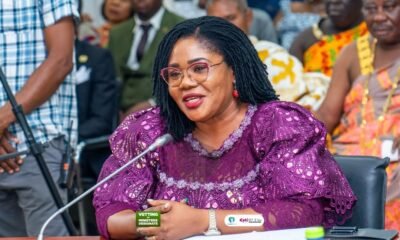Bussiness
Overview of the copyright law of Ghana [Part 2]

Economic rights of authors
‘Economic right’ is a legal right, which empowers the author or the creator of a work to monetise their creativity.
Section 5 of Act 690 gives an author the exclusive right to authorise or prohibit any of the following acts in relation to the work:
1. The reproduction of the work in any manner or form.
2. The translation, adaptation, arrangement or any other transformation of the work.
3. The public performance, broadcasting and communication of the work to the public.
4. The distribution to the public of originals or copies of the work by way of first sale or other first transfer of ownership, and
5. The commercial rental to the public of originals or copies of the work.
Moral rights of authors
Act 690 also confers moral rights on authors. ‘Moral right’ is a legal term which describes the perpetual bond between a copyright protected work and its author/creator. It is therefore granted to natural persons and exists in perpetuity. It cannot be waived even if the author assigns or transfers all his economic rights in the work.
The moral rights granted under Act 690 are:
1. The right to claim authorship of the work and to be named as the author
2. The right to object and seek relief in case of any distortion, mutilation or modification of the work, where that act would be prejudicial to the reputation of the author.
Related rights
Related rights or neighbouring rights refer to the legal protection accorded certain individuals or legal entities that contribute to the dissemination of a work by making it available to the public. The term of protection for related rights is, however, limited.
The three (3) main beneficiaries of related rights are:
1. Performers
2. Producers of sound recordings or phonograms, and
3. Broadcasting organisations
The Copyright Act, 2005 (Act 690) grants performers rights in their performances, producers of phonograms rights in their phonograms and broadcasting organisations rights in their broadcasts.
Transfer of copyright
An author or a copyright owner can transfer all or part of his economic rights in a work to another person or entity. Under the law, such a transfer must be done through a written contract and the person or entity who acquires the rights becomes the holder of the rights.
Under Section 9 of Act 690, copyright can be transferred by assignment (sale), testamentary disposition or by operation of the law.
Copyright owners can also grant licences to other persons to use their works for a specific period of time after which the rights revert to the copyright owner.
Duration of copyright
The economic rights of an author are protected during the life of the author and 70 years following his/her death.
In the case of corporate bodies, sound recordings and audiovisual works, the term of protection is 70 years.
Permitted uses of copyright
Sections 19 to 23 of Act 690 provide for exceptions to the exclusive rights conferred on copyright owners. Thus, under specified conditions, copyright works can be used without the consent of the author or rightsholder as the case may be. The permitted uses include use of the work for private and personal purposes, teaching & research and current news reporting. In the case of computer programmes, a single copy of the programme can be reproduced as a backup; likewise, libraries and archives can make a single copy of a protected work (book) for backup. However, a whole book or a substantial part of a book cannot be reproduced for any private or personal purpose.
Enforcement of copyright and related rights
Civil remedies and criminal sanctions are available under the Copyright Act, 2005 (Act 690) to deal with copyright infringement.
A person whose rights are infringed can apply to the High Court for an injunction to prevent the infringement and can also recover damages for the losses suffered as a result of the infringement.
Section 42 of the Copyright Act, 2005 (Act 690) sets out the various copyright offences. The penalty for a copyright offence ranges between a fine of five hundred penalty units and one thousand penalty units; a term of imprisonment of not more than three years; or both.
The law also provides for an alternative dispute resolution mechanism where parties to a copyright dispute can apply to the Copyright Office for a mediation.
The copyright monitoring team
The Copyright Monitoring Team was established to assist the Copyright Office in its enforcement activities. The team comprises two officers of the Copyright Office, a number of police officers and five representatives of copyright owner organisations. The team, since its inception has assisted the Copyright Office in its anti[1]piracy exercises as well as educational copyright campaigns.
Collective management of rights
The first collective management organisation to be set up in Ghana was the Copyright Society of Ghana (COSGA). It was established in 1986 in accordance with Section 42 of PNDC Law 110. In 1992, the Copyright Society of Ghana (COSGA) Regulations (L.I. 1527) were passed to regulate the activities of COSGA. COSGA was supposed to be a multi-disciplinary collecting society, administering the rights of all copyright owners. However, COSGA ended up administering the rights of only music rightsholders.
The Copyright Act, 2005 (Act 690) liberalised the formation of collective management organisations. At the moment, there are three (3) collective management organisations in Ghana namely:
1. The Audiovisual Rights Society of Ghana (ARSOG)
2. Copy Ghana (Reprographic Rights Organisation) and
3. The Ghana Music Rights Organisation (GHAMRO)
The mandate and activities of these organisations are discussed in chapter 6 of the study.
Voluntary registration of copyright
Act 690 provides for the voluntary registration of copyright. The purposes of the registration as stipulated under Section 39 of Act 690 are:
1. To maintain a record of works
2. To publicise the rights of the owners and
3. To give evidence of the ownership and authentication of intellectual property.
On average, 940 works are registered annually.
The copyright system is very dynamic. The rapid advancement in technology makes it imperative for copyright legislations to be updated on regular basis. Although Ghana has a relatively good copyright legislation, complying with minimum international standards in copyright, there is the need to review it in order to keep pace with the ever-changing developments in copyright. In this regard, the Copyright Office is in the process of reviewing the copyright legislation of Ghana.
[This piece is culled from a study conducted by Magnus Ebo Duncan (PHD), titled: “Economic contribution of copyright industries in Ghana”]
Bussiness
Ghana’s GDP shows economy is fast recovering despite DDEP – Finance Ministry

Ghana’s Gross Domestic Product (GDP) indicates a rapid economic recovery despite global challenges and ongoing debt restructuring, according to the Ministry of Finance (MoF).
The Ministry in a statement today indicated that latest data from the Ghana Statistical Service (GSS), cumulative economic growth for the second quarter (Q2) of 2024 reached 6.9%, a notable increase from the 4.7% recorded in the first quarter of 2024.
The MoF statement further noted that, “The economy’s robust recovery is in response to the macroeconomic stability and growth interventions that government is pursuing under our IMF-supported Post Covid-19 Programme for Economic Growth (PC-PEG).”
According to them, the overall real GDP growth for the first half of 2024 rebounded strongly, with year-on-year GDP growth averaging 5.8% for the period, significantly higher than the 2.9% recorded in the same period in 2023.
By Edem Mensah-Tsotorme
Read full statement below


Bussiness
Facebook, Youtube, online trading companies must be taxed – Deputy Finance Minister

The Deputy Finance Minister Dr Alex Ampaabeng, has proposed that online trading companies should be taxed to bolster the economy.
He noted that these companies, both local and international, generate significant revenue from their Ghanaian clients, which underscores the necessity for taxation.
In an interview with Bernard Avle on Channel One TV’s The Point of View, Dr Ampaabeng pointed out various potential revenue sources for Ghana, including online businesses and content creation companies.
He questioned why other national companies operating in Ghana are taxed, but social media platforms like Youtube and Facebook, which run numerous advertisements, are not included in the Ghanaian tax system.
According to him, these social media companies earn profits from the advertisements they display, and online trading companies also generate income from the sale of their products and services.
He mentioned online trading companies such as Jiji, Jumia, and Tonaton, which he believes surpass all physical marketplaces in Ghana in size.
According to him, “I can’t think of a country which has not gotten a digital service tax system of some sort, so Ghana is long overdue. Just to make an example so that people will appreciate where I’m coming from. Go to Youtube and play a video, within one or two minutes, you are going to watch about two, or three adverts.”
“What it tells you is that Facebook or Youtube is making profits right here in Ghana. Go to your Facebook account, and you are going to see a number of adverts on your right, left. What it is telling you is that Facebook is making profits right here in Ghana and not being taxed. Meanwhile, there are companies operating in Ghana, for jurisdiction reasons, of course, that are being taxed,” he said.
The Deputy Minister added that “So then, it comes to the question of the application of our tax laws. Revenues generated in Ghana are subject to taxes. We have Facebook, TikTok and all those players, these are digital platform owners.”
He stressed, “Then we have the digital or market players, here we are talking about individuals who are using the digital platforms. We have Jiji, Jumia, Tonaton, these combined, are bigger than all physical marketplaces in Ghana. And it tells you the volume of transactions, that are going on there.”
He expressed his hope that individuals earning online profits from Ghanaian residents would be taxed.
“There are conversations ongoing, I wouldn’t want to pre-empt anything, maybe in the future, it might not be anytime soon, what I would like to see, is a Ghana where people who are earning all forms of profits in the country are subject to taxes. People who are trading online to Ghanaian residents, people who are generating revenue from Ghana are allowed to pay taxes,” he noted.
Additionally, he proposed a collaboration with the government to curb cybercrime by registering and verifying these online trading companies.
“We can have a system where the government engages these operators, so individuals will submit their Ghana Card and are registered and verified,”he concluded.
Source: Citinewsroom.com







